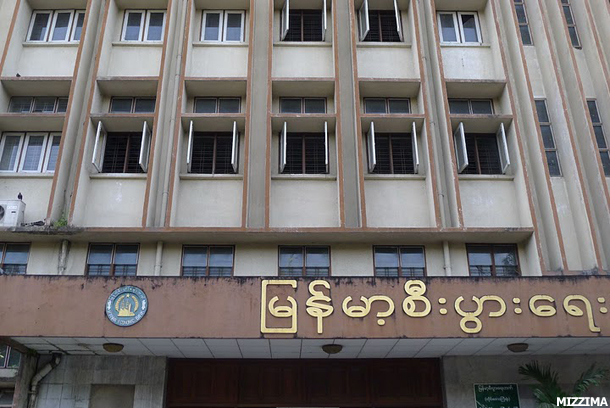Rangoon (Mizzima) – When it comes to corruption, Burma is just a whisker away from rock bottom.
 In the Corruption Perceptions Index Report for 2010 released by Transparency International, Burma ranks second to the bottom among 176 countries surveyed worldwide by the international corruption watchdog.
In the Corruption Perceptions Index Report for 2010 released by Transparency International, Burma ranks second to the bottom among 176 countries surveyed worldwide by the international corruption watchdog.
Just how bad this ranking is can be seen by who Burma ranks alongside. Transparency International puts the war-torn failed state of Somalia at rock bottom and ranks Burma level with Afghanistan, a country in the grip of a bitter war and plagued by the Taliban and terrorist groups.
Of late, Burma’s leaders are paying lip service to the problem of graft. At the farewell meeting held at Naypyidaw on March 25, junta chief Senior General Than Shwe admitted that the economic development of Burma is lower than even Laos and Cambodia. This was the first ever admission made by a military junta leader about the lack of development in the country. At the meeting, Than Shwe called on the newly elected government to fight against corruption.
Corruption and bribes have long been cited as contributing to Burma's stagnant economy, along with mismanagement, misguided economic policies and lack of a vibrant banking system. Pictured is the Myanma Economic Bank in Rangoon. Photo: Mizzima
The irony of these statements was not lost on critics. The junta chief came to power through a coup and much of the people’s suffering, critics say, is due to the corruption of the government machinery over nearly half a century.
Corruption is endemic in Burma today. As Mizzima found when it went out to talk to people, corruption affects people on a number of levels. There are many stories of how people suffer due to corrupt government machinery, through exploitation and the misuse of power and through mismanagement. Nearly everyone has to pay money to obtain services that ought to be theirs under their lawful civil rights.
In ‘Grease Money’, the first of a series, we take a look at how corruption affects people in Burma.
ID card and grease money
Zar Zar is still holding her national registration certificate (ID), which she received when she was 12 years old. This ID card is only for children who are Burmese nationals from 12-18. Although she is now over 27 years old, she has not changed the card.
ID cards are issued at ages 12, 18 and 30 and citizens are supposed to obtain the cards when they reach these ages.
‘Yes, I have not changed my ID because I cannot afford to pay for it’, she said. ‘I got this child ID when I was in primary school, and we didn’t need to pay a single penny at that time. The immigration officials came to our school and made these cards free of charge. It will cost at least 10 to15,000 kyat (US $12-17) if I change it to an adult ID now’.
This cost is not the official payment prescribed by the government department but she cannot even begin to start the process of obtaining the ID unless she pays ‘grease money’.
“I am a housewife now and my child is in nursery. My husband is a bus conductor so that we live hand to mouth. We can never save this 10-15,000 kyat. So I cannot change my ID yet’, she said.
Those who are willing to pay the bribes can obtain an ID card. Tun Tun, despite being a foreign national, found he could get an ID card by paying grease money.
‘My elder brother called me from Malaysia and told me that Malaysia was calling for more workers and urged me to get this national ID and apply for a passport’, said Tun Tun. ‘I asked someone in the Immigration and Manpower Department (known as La Wa Ka) about applying for a passport. He said that it would cost me about 60,000 kyat (US $70) because I am a foreigner. It is difficult for a foreigner to apply for a Burmese passport, he said. I got my passport by giving this money because I needed it quickly.
‘I had to visit their office in person only one time when I needed to give my fingerprints. They did the rest. But my elder brother spent only 20,000 kyat (US $23) when he applied for his passport’, Tun Tun said, looking irritated by the thought of having to pay more grease money.
Who you know, however, can count. One woman received her ID card easily without paying any grease money due to a person in authority and power.
‘I got my ID within three days’, said May Moe. ‘I spent about 3,000 kyat (US $3.5). I forgot the exact amount that I spent for my ID because my uncle is on the staff of La Wa Ka’, she said.
May Moe explained that getting an ID is not expensive if one obtains it through official channels and procedures.
‘You must buy the form first. It is also available at our Ward/Block Peace and Development Council (Ward PDC) offices. These offices once sold this form for 200-300 kyat (US $ 23-35 cents). Now I heard that they are selling the forms at about 1,000 kyat (US $1.16)’.
Her uncle smoothed the way. ‘I first bought the form and filled it out. Then I visited the office with my uncle. The office took my fingerprints immediately. I checked my blood group and gave them that the next day. Then I got my ID on the third day. It’s so easy’, she said.
Yes, easy in Burma if you know someone, or if you have enough money to pay corrupt officials.
Corruption in Burma, Part II, will appear soon.


